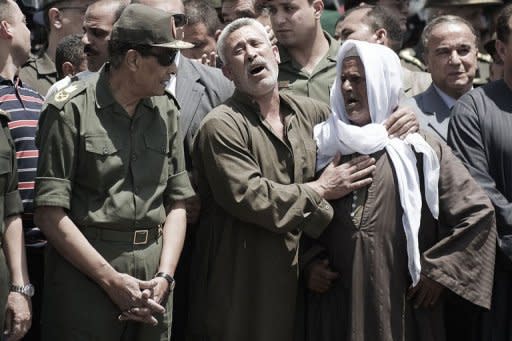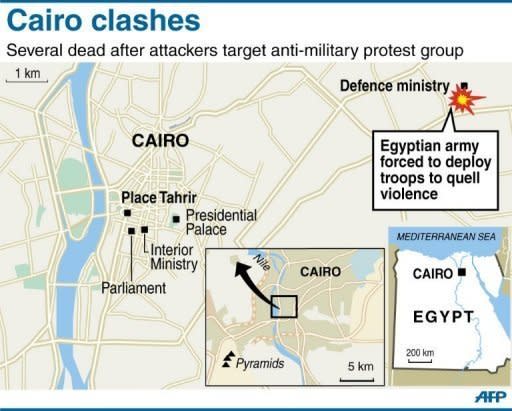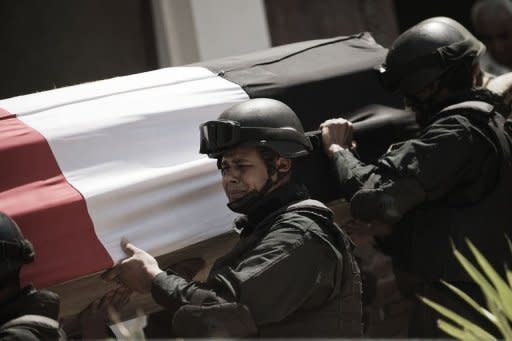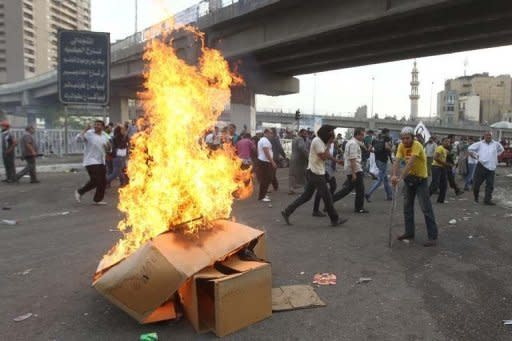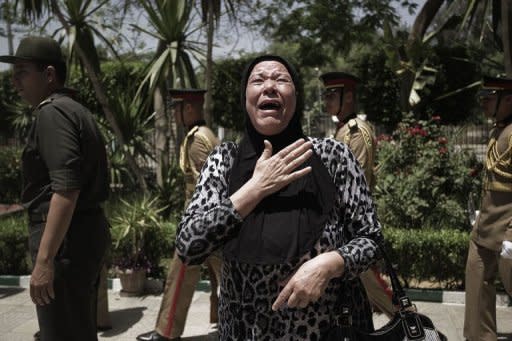Mass detentions in Egypt after deadly Cairo clashes
Egypt's military ruler attended Saturday an unprecedented public funeral for a soldier killed in clashes with protesters as the army detained 179 people over the violence in the run-up to landmark presidential polls. Following the arrest of 320 people after Friday's clashes near the defence ministry in Cairo, the prosecution "has decided to hold 179 people, including 13 women, for 15 days pending investigation," a military source said. The ruling Supreme Council of the Armed Forces (SCAF) had imposed an overnight curfew in the Abbassiya neighbourhood after fighting between troops and anti-military protesters that left two people dead -- including a solider-- and nearly 300 injured. The clashes erupted just three weeks ahead of Egypt's first presidential election since a popular uprising ousted president Hosni Mubarak last year. The SCAF has vowed to hand power to civilian rule when a president is elected, but protesters believe the army wants to maintain a degree of power even after the elections and fear the polls will rigged in favour of a pro-military candidate. In Cairo, military ruler Field Marshal Hussein Tantawi attended the funeral of Samir Anwar Ismail, who died in Friday's clashes. Tantawi and his deputy Sami Enan, joined the procession after the funeral prayer for Ismail, a member of a special forces unit, his comrades told AFP. Horse-drawn carriages pulled the coffin behind honour guards carrying wreaths as Tantawi, Enan and other SCAF members followed alongside the family of the dead soldier. The military in the past had refused to disclose their casualties in clashes with protesters, saying it did not want to affect the morale of the army. But it made an exception with Ismail's funeral because "his death at the hands of protesters represents a clear attack on the army," an officer told AFP. Saturday's press called for an end to the violence, with state-owned newspapers calling on protesters to confine their demonstrations to Tahrir Square -- the epicentre of the uprising that toppled Mubarak. "Tahrir is calling Abbassiya: Go back to the square," the state-owned Al-Gomhuriya said on its front page headline. "Enough Blood," said the government owned Al-Akhbar. On Saturday morning, after the curfew ended at 0500 GMT, the protests had subsided in the area surrounding the defence ministry, while soldiers and armoured personnel carriers blocked off a road leading to the ministry. Officials at Al-Zahra University hospital said on Friday they received two people who died in the skirmishes outside the ministry. A frontline medic group said they died of gunshot wounds. The health ministry said only the soldier died, while at least 296 people were hurt in the clashes, including 131 who were treated in hospital. The SCAF had imposed the curfew starting from 2100 GMT, and pledged in a statement to "decisively confront" any attempts to break it. Earlier on Friday, military police had charged the protesters, chasing them down side streets near the ministry on foot and in military vehicles, firing birdshot and assault rifles into the air amid chaotic scenes. A blanket of thick smoke engulfed Abbassiya square, where several thousand secular and Islamist protesters had gathered, some marching there from Tahrir Square, to denounce the SCAF. The clashes began when some protesters threw rocks at the military police. The unrest comes ahead of the landmark presidential polls amid fears by many Egyptians that the military rulers will renege on a pledge to hand power to civilian rule after the election and that the vote will be rigged. "We are here to end SCAF rule. We don't trust them. SCAF is following Mubarak's example, and we want to protect the revolution," said Mohammed Badawi from Ismailiya, a member of the Coalition of Revolution Youth. The Abbassiya neighbourhood witnessed deadly clashes just two days earlier, which the health ministry said left at least nine people dead, though field medics say more died. On Wednesday, unknown attackers stormed a sit-in near the defence ministry by supporters of Salafist politician Hazem Abu Ismail, after he was disqualified from the presidential race. Other candidates include former Arab League chief Amr Mussa and Mubarak's last premier Ahmed Shafiq. The powerful Muslim Brotherhood has fielded the head of its political arm Mohammed Mursi whose main Islamist rival is Abdel Moneim Abul Fotouh, a former Brotherhood member. On Thursday, the SCAF vowed that the presidential election will be fair and moved to assure the public it will hand over power on schedule but warned against protests outside the defence ministry. The presidential election is scheduled for May 23 and 24 with a run-off for June 16 and 17 if there is no outright winner. The military vowed it would transfer power to civilian rule before the end of June, or by May if there is a clear winner in the first round.

